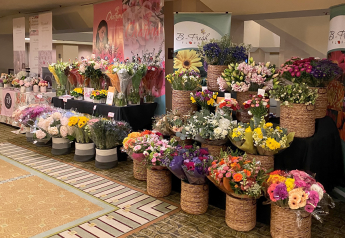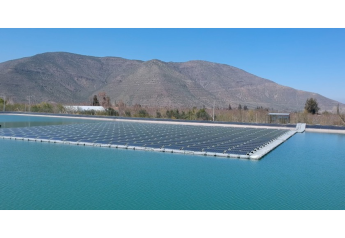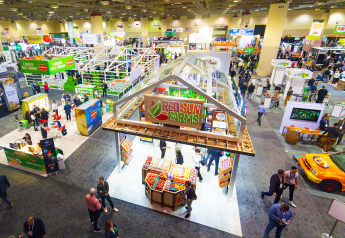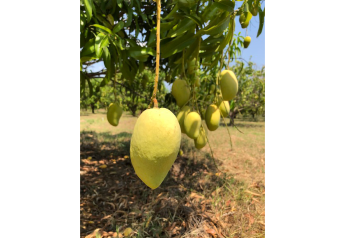New Jersey crops even out after warm, cool spells
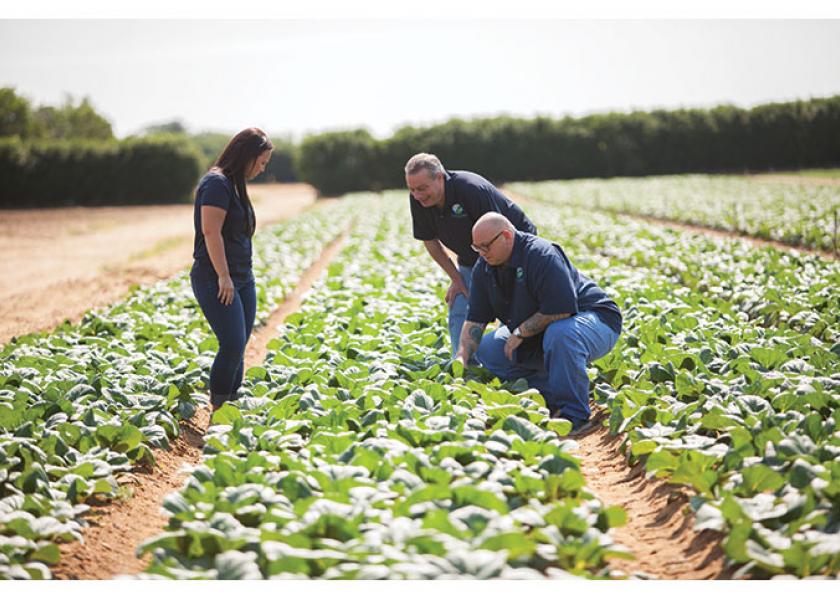
With the way the crops in New Jersey are going, you would hardly know there’s a pandemic.
“In June, we’ll be rolling strong,” said Bill Nardelli Jr., vice president of sales and marketing for Nardelli Bros. Inc., Cedarville, N.J.
“Even with this whole COVID-19 pandemic we’ve been going through, we’ve stayed pretty steady.”
A mild winter gave way to a chilly spring in New Jersey, causing some growers to plant earlier than previous years but harvest at typical times.
“Mother Nature always has a way of evening things out,” Nardelli said.
Early crops show good size and quality, which is expected to continue as the Garden State’s summer and fall seasons unfold, said Joe Atchison, marketing and development director of the state’s Department of Agriculture, Trenton, N.J.
“While it is early in the season, the outlook is positive,” Atchison said.
Related content: Snapshot: NJ produce season through the eyes of Nardelli Bros.
The Vegetable Growers Association of New Jersey reported that a few farmers had a bit of a slowdown, but by May 20, they were back on track in the fields, agriculture commissioner Douglas Fisher said on a May 23 video for the Eastern Produce Council, New Providence, N.J.
Sweet corn was about two feet tall in southern Jersey, he said.
“There are tomatoes, peppers, eggplant, squash all coming along, as well as a large variety of greens, looking very fine and being harvested right now,” Fisher said in the video.
As May unwound and June kicks off, growers were finishing up asparagus and strawberries while still harvesting leafy greens, spinach and herbs. Squash, beans and cucumbers start in June and continue into July, when growers start with volumes of sweet corn, tomatoes, peaches, eggplant and peppers, among other specialty crops, Atchison said.
The New Jersey Peach Promotion Council reported that peaches should start about July 1, “and we’re expecting an excellent, healthy crop,” Fisher said in the video. An especially cold week in May helped the thinning process, so losses were minimal, according to the peach council.
BY THE NUMBERS
Some of New Jersey’s biggest specialty crops are blueberries, peppers, peaches, asparagus, cranberries, squash and spinach, according to the U.S. Department of Agriculture’s National Agricultural Statistics Service.
In 2019, the state harvested:
- 9,300 acres of (not wild) blueberries, yielding 5,090 pounds per acre for a total of 47.3 million pounds and $85.3 million value;
- 3,500 acres of bell peppers, yielding 33,600 pounds per acr to produce 117.6 million pounds, worth $45.9 million;
- 3,900 acres of peaches year, yielding 10,000 pounds an acre to produce 39 million pounds and a $25.7 million value;
- 2,000 acres of asparagus, yielding 3,584 pounds per acre, for a production of 7.2 million pounds, valued at $16.3 million;
- 2,700 acres of cranberries, yielding 196 barrels per acre for a production of 529,000 barrels and $14.5 million value;
- 3,200 acres of squash, yielding 10,080 pounds per acre for a total of 32.3 million pounds and a $13.7 million value; and
- 1,900 acres of spinach, yielding 13,440 per acre for a total of 25.5 million pounds and a $6.7 million value.
In June 2019 alone, New Jersey shipped 17.8 million pounds of blueberries, compared to 16.4 million pounds in June 2018, according to USDA’s annual Fresh Fruit and Vegetable Shipments report.
Peaches came next by weight, followed by nectarines and cranberries.
Related content: New Jersey produce news
FAMILY FARMS
After the unseasonably cool spring that delayed harvesting most crops seven to 10 days, the warming trend before Memorial Day should help Consalo Family Farms, Egg Harbor City, N.J., catch up on production.
That will “put all vegetable crops in full swing,” said Chelsea Consalo, vice president of produce. The Consalos also have a farm in Hammonton, a sales company, Freshwave Fruit and Produce, in Vineland, N.J., and farm partnerships nationwide.
Blueberries are at the front edge their season, which should run through July, Atchison said.
Consalo’s initial estimates were to begin harvesting the New Jersey blueberry crop June 3-5. Instead, because of the cooler weather, she expects to begin about June 13.
Meanwhile, Consalo Family Farms began harvesting cooking greens and herbs May 1 and romaine and leaf lettuce May 8.
“Even though the cool weather caused delays in harvest, it has resulted in outstanding quality on all of our items,” Consalo said.
Customers can expect a full line of New Jersey vegetables and blueberries during the spring, summer and fall with great sizing and quality, she said.
Nardelli Bros. also has farm partnerships elsewhere but grows more than 80 commodities during New Jersey’s season, said Nardelli, part of the fifth generation who runs several hundred acres of family farms with his brother, Jimmy Nardelli II, vice president of production and operations, and their father, Bill Nardelli Sr., president.
Founded in 1898, the company also has cooling and packing facilities in Cedarville, a distribution center in Vineland, N.J., and a fleet of trucks to deliver the products to retail stores.
The Nardellis’ New Jersey season starts with asparagus in mid-April, continuing all the way through to summer dry items, such as peppers, cucumbers and squash, and then back to wet items such as lettuces and greens until Thanksgiving.
In June, the company will have a lot of wet greens, Nardelli said: romaine, red leaf, green leaf, Boston, endive, escarole, many cooking greens, parsley and cilantro.
Cabbages — green, red, savoy, napa, bok choy — come in early June. Come mid-June, expect green and yellow squash, then cucumbers. By the end of June and early July, Nardelli Bros. will harvest peppers and three flavors of corn.
June is prime time for variety from the Nardelli farm as spring and summer harvests intermingle.
“We can put as many as 30 items on one truck. That gives our customers a lot of variety with two seasons overlapping a bit,” Nardelli said.
About 90% to 95% of the acreage is conventional crops, but the Nardellis are gradually adding more organic crops to meet rising demand, he said.
INDOOR AGRICULTURE
While southern New Jersey is full of open, green, rural farmland, northern New Jersey — especially the densely populated northeastern region just across the Hudson River from New York City — is another beast entirely.
A growing trend there, as well as at other Northeastern urban areas, is indoor, controlled atmosphere agriculture, particularly vertical farms.
Related content: How indoor, vertical Bowery Farming is faring during COVID-19
Vertical farms, in which rows of crops are stacked one on top of another using LED lights and automated growing systems, are mainly reserved for leafy greens and herbs that don’t require much space and have quick growing cycles.
Bowery Farming’s headquarters is in Manhattan, but its original farm, which is now a research and development farm, is in Kearny, N.J. The company has since created a second farm in Kearny allowing for 30 times more output than the first farm, according to the company.
There are multiple grow rooms with different temperatures and humidity capabilities for different types of crops.
It’s a commercial, hydroponic, automated indoor farm to serve brick-and-mortar retailers within a 150-mile radius in the tri-state area, said Carmela Cugini, executive vice president of sales.
The proprietary technology includes machine learning, which means that all the growing tricks learned at the first farm are already in place at the second, where even more advancements can build upon the foundation of knowledge, Cugini said.
Bowery Farming grows arugula, baby kale, bok choy, butterhead lettuce, kale mix, romaine, spring blend, basil, cilantro and parsley.
Close by in Newark, N.J, there’s AeroFarms, another indoor vertical farm using its own proprietary technology to grow, not hydroponically, but with a patented aeroponic system that uses a mist of nutrients, water and oxygen and no sun or soil. The company began in 2004.
It’s in season year-round at these vertical farms.
Related content: These companies made Thrive's Top 50 AgTech and AgFood lists


